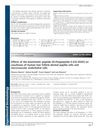 2 citations,
February 2023 in “BMC women's health”
2 citations,
February 2023 in “BMC women's health” Birth control pills change the activity of certain inflammation and blood clotting genes in women with PCOS.
 9 citations,
April 2019 in “Biomolecules & Therapeutics”
9 citations,
April 2019 in “Biomolecules & Therapeutics” Udenafil may help hair grow by activating certain stem cells.
 144 citations,
November 2020 in “Frontiers in immunology”
144 citations,
November 2020 in “Frontiers in immunology” Targeting the IL-23/IL-17 pathway effectively treats several inflammatory skin diseases.
137 citations,
January 2006 in “Frontiers in bioscience” CRH in the skin acts like the body's stress response system, affecting cell behavior and immune activity.
36 citations,
June 2015 in “International journal of toxicology” Trichloroethylene causes skin inflammation in mice by increasing certain immune proteins.
 77 citations,
June 2017 in “Advances in Therapy”
77 citations,
June 2017 in “Advances in Therapy” New treatments for Alopecia Areata, like JAK inhibitors, show promise for hair regrowth and are likely to change future treatment approaches.
 7 citations,
December 2015 in “Experimental Dermatology”
7 citations,
December 2015 in “Experimental Dermatology” Sh-Polypeptide 9 may be better than minoxidil for hair growth and protection against damage.
 30 citations,
May 2016 in “Expert Opinion on Biological Therapy”
30 citations,
May 2016 in “Expert Opinion on Biological Therapy” New treatments targeting immune pathways show promise for severe hair loss but need more research for safety and effectiveness.
23 citations,
January 2014 in “Evidence-based Complementary and Alternative Medicine” Mushroom beta-glucans from Ganoderma lucidum can reduce tumor size and metastasis in cancer.
 111 citations,
June 2002 in “The EMBO Journal”
111 citations,
June 2002 in “The EMBO Journal” Too much Smad7 can cause serious changes in skin tissues, including problems with hair growth, thymus shrinkage, and eye development issues.
August 2024 in “Journal of Photochemistry and Photobiology B Biology” Combining light therapy with certain substances improves hair growth in people with hair loss.
 36 citations,
December 2002 in “Experimental dermatology”
36 citations,
December 2002 in “Experimental dermatology” Barley extract, specifically procyanidin B-3, can promote hair growth and counteract growth inhibition.
40 citations,
July 2015 in “Kidney International” IL-3 worsens lupus nephritis and blocking it improves kidney health.
 10 citations,
July 2011 in “Springer eBooks”
10 citations,
July 2011 in “Springer eBooks” Carboxytherapy can improve skin conditions with few side effects, but results may vary and are not guaranteed.
 27 citations,
January 2012 in “Current Topics in Microbiology and Immunology”
27 citations,
January 2012 in “Current Topics in Microbiology and Immunology” Mice that can regenerate tissue have cells that pause in the cell cycle, which is important for healing, similar to axolotls.
 10 citations,
August 2018 in “Dermatologic Surgery”
10 citations,
August 2018 in “Dermatologic Surgery” Laser treatment improves hair density and increases growth factors in androgenetic alopecia.
 20 citations,
January 2019 in “Journal of dermatological science”
20 citations,
January 2019 in “Journal of dermatological science” Male hormones indirectly affect skin cell development by increasing growth factor levels from skin fibroblasts.
 9 citations,
November 2018 in “Drug Discovery Today”
9 citations,
November 2018 in “Drug Discovery Today” Using skin stem cells and certain molecules might lead to scar-free skin healing.
 14 citations,
July 2021 in “Reviews in endocrine and metabolic disorders”
14 citations,
July 2021 in “Reviews in endocrine and metabolic disorders” SARS-CoV-2, the virus causing COVID-19, can affect all endocrine organs and systems, altering their function and potentially leading to disorders. Factors like diabetes and obesity increase infection risk and severity. Understanding these effects is key for effective treatment.
 September 2024 in “Journal of Inflammation Research”
September 2024 in “Journal of Inflammation Research” Type 1 Diabetes prevents hair growth by causing cell death in hair follicles.
January 2015 in “American journal of medical and biological research”  18 citations,
June 2019 in “Clinical research in dermatology”
18 citations,
June 2019 in “Clinical research in dermatology” Acne can't be cured but can be managed with treatments like benzoyl peroxide and diet changes; it's costly and can lead to scarring and mental health issues.
 January 2003 in “Springer eBooks”
January 2003 in “Springer eBooks” Certain genes are linked to type 1 and type 2 diabetes in kids, and changes in these genes can also cause other diabetes-related conditions.
 September 2023 in “Medicine”
September 2023 in “Medicine” The research suggests immune system changes and specific gene expression may contribute to male hair loss, proposing potential new treatments.
 178 citations,
August 2016 in “Advances in wound care”
178 citations,
August 2016 in “Advances in wound care” New effective scar treatments are urgently needed due to the current options' limited success.
Curcuma aeruginosa Roxb. may help treat hair loss by affecting specific biological pathways.
 2 citations,
July 2022 in “Frontiers in Cardiovascular Medicine”
2 citations,
July 2022 in “Frontiers in Cardiovascular Medicine” Forsythiasides have multiple health benefits but may cause pseudoallergic reactions, and more research is needed.
 100 citations,
September 1999 in “British Journal of Dermatology”
100 citations,
September 1999 in “British Journal of Dermatology” The study found that two enzymes linked to hair loss are located in different parts of the scalp, supporting a common treatment's effectiveness.
 3 citations,
March 2019 in “Chinese Medical Journal”
3 citations,
March 2019 in “Chinese Medical Journal” CO2 fractional laser therapy may help regrow hair without scarring by affecting certain inflammatory and growth-related molecules.
1 citations,
June 2021 in “Journal of pharmacopuncture” CBD may help restore hair growth-related protein levels in alopecia caused by hormones or other factors.






















